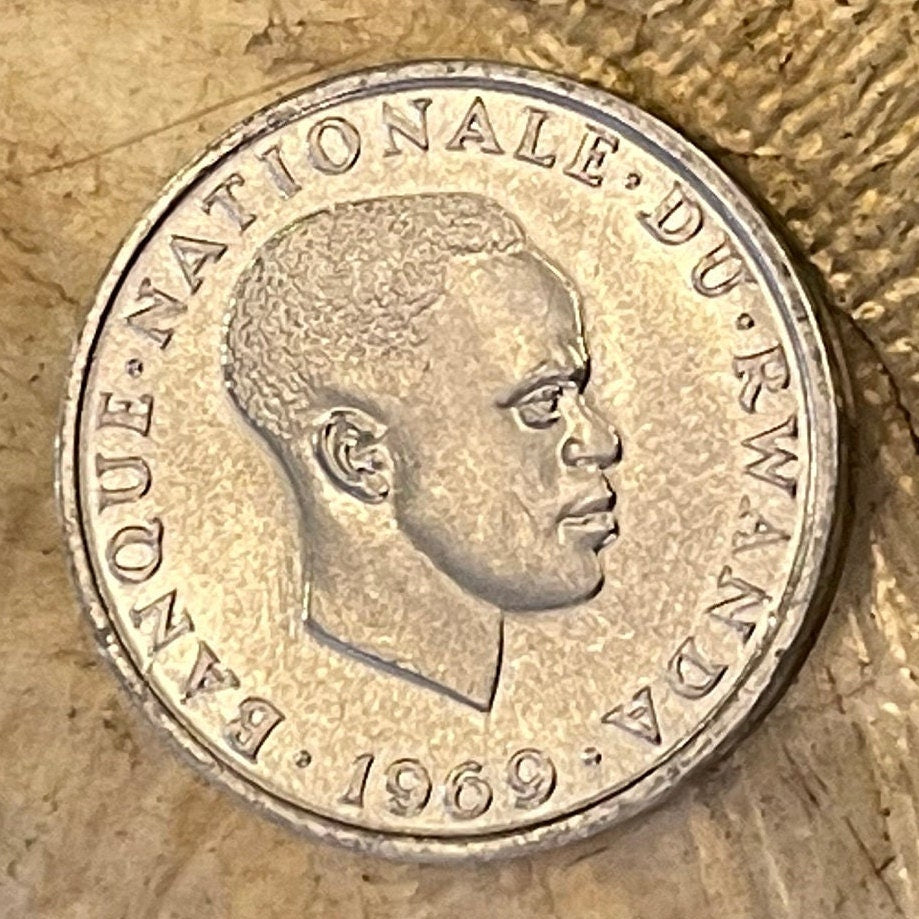elemintalshop
Revolutionary Grégoire Kayibanda 1 Franc Rwanda Authentic Coin Money for Jewelry and Craft Making (Hutu Emancipation) 1969
Revolutionary Grégoire Kayibanda 1 Franc Rwanda Authentic Coin Money for Jewelry and Craft Making (Hutu Emancipation) 1969
Couldn't load pickup availability
Revolutionary Grégoire Kayibanda 1 Franc Rwanda Authentic Coin Money for Jewelry and Craft Making (Hutu Emancipation) 1969
Obverse: Portrait of Grégoire Kayibanda
Lettering: .BANQUE.NATIONALE.DU.RWANDA.
1969
Translation: .NATIONAL.BANK.OF.RWANDA
1969
Reverse: Coat of Arms (Old)
Lettering: UN · FRANC 1
REPUBLIQUE RWANDAISE
LIBERTE COOPERATION PROGRES
Translation: ONE · FRANC 1
REPUBLIC OF RWANDA
FREEDOM COOPERATION PROGRESS
Features
Issuer Rwanda
Period Republic (1964-date)
Type Standard circulation coin
Year 1969
Value 1 Franc (1 RWF)
Currency Franc (1964-date)
Composition Aluminium
Weight 1.1 g
Diameter 21 mm
Shape Round
Orientation Coin alignment ↑↓
Demonetized Yes
Number N# 5866
References KM# 8, Schön# 10
Wikipedia:
Grégoire Kayibanda (May 1, 1924 – December 15, 1976) was a Rwandan politician and revolutionary who was the first elected President of Rwanda from 1962 to 1973. An ethnic Hutu, he was a pioneer of the Rwandan Revolution and led Rwanda's struggle for independence from Belgium, replacing the Tutsi monarchy with a republican form of government. Rwanda became independent from Belgium in 1962, with Kayibanda serving as the country's first president, establishing a pro-Hutu policy and a de facto one-party system governed by his party, Parmehutu. He was overthrown in a coup d'état in 1973 by his defense minister, Juvénal Habyarimana, and died three years later.
Early life and education
Grégoire Kayibanda was born on 1st May 1924 in Tare, Rwanda. He studied his primary school at Tare then at Kabgayi. Kayibanda was admitted in Saint Léon Minor Seminary of Kabgayi in 1937. After the completion of minor seminary in 1943, he continued to Major Seminary of Nyakibanda where he studied for four years.
Background
The Hutu majority had long been resentful of power held by the Tutsi minority. They were encouraged by Hutu advocates in the Catholic Church, and by Christian Belgians (who were increasingly influential in the Congo). The United Nations mandates, the Tutsi elite class, and the Belgian colonists contributed to the growing social and political unrest. Gregoire Kayibanda, an ethnic Hutu, led the Hutu "emancipation" movement. He founded the political party Parmehutu (Parti du Mouvement de l'Emancipation Hutu; Hutu Emancipation Movement Party), and wrote his "Bahutu Manifesto" in 1957.
In reaction, in 1959 Tutsis founded the UNAR party, made up of those who desired immediate independence for Ruanda-Urundi based on the existing Tutsi monarchy. This group also became quickly militarized. Skirmishes began between UNAR and PARMEHUTU groups. Kayibanda's successful campaign brought the majority Hutu to power for the first time in Rwanda.
In 1961 the Rwandan monarchy was dissolved and a brief transitional administration was led by Dominique Mbonyumutwa. Rwanda became independent at midnight on 1 July 1962. Kayibanda spoke at ceremonies later that day to commemorate the occasion, thanking the people who had contributed to the country's independence. He also thanked the work of the Belgians, Germans, and United Nations in developing the country. He said, "Though the Belgians made some mistakes here, the net result of their effort has been most positive," and appealed to them and other countries for technical aid. He led Rwanda's first delegation to the United Nations General Assembly on 18 September. Kayibanda was elected president on October 26. Over the next three years, Kayibanda increased his power step by step. By 1965, Parmehutu was the only legal party in the country. At elections held that year, Kayibanda appeared alone on the ballot for president. He was reelected in 1969, again as the only candidate. In both elections, a single list of Parmehutu candidates was returned to the legislature. The 1962 constitution of Rwanda, enacted by Kayibanda's regime, proscribed communist activities and propaganda as Belgian settlers conditioned the gain of independence to the rejection of Communism, in the era of the iron curtain. The UNAR party threatened to turn their back on the Belgians and adhere to communism.
Kayibanda pursued a pro-Western, anticommunist foreign policy. Rwanda enjoyed cordial relations with the Republic of China, while strongly criticizing the People's Republic of China's policies in Africa. Kayibanda's government adopted a generally neutral stance on the Arab–Israeli conflict and the Vietnam War.
In the presidential elections of 1973 A project promulgated on May 18 was presented, the duration of the presidential term of Kabiyanda was extended from 4 to 5 years, the age limit of 60 years was also eliminated. With North-South regionalist rivalries, President Kayibanda's regime was accused of having progressively dismissed the political leaders of the north and of concentrating power in the hands of the nationals of his native prefecture, Gitarama.
Death
On July 5, 1973, defense minister Major General Juvénal Habyarimana overthrew Kayibanda in a military coup. Although described as bloodless, as a result of the coup, an estimated 55 people, mostly officials, lawyers or businessmen close to the previous regime, were reportedly executed. The families of these people were given sums of money to pay for their silence. The new government held Kayibanda and his wife in a secret location (rumored to be a house near Kabgayi), where they were reportedly "starved to death".
********
The first coat of arms of the Republic was adopted after the proclamation of independence by Art. 4 of the republican constitution.
....The Motto of the Republic shall be "Liberty, Cooperation, Progress."
...The Seal of the Republic shall be composed of ideograms of a dove and olive branch, a hoe and billhook, a bow and arrow, respectively symbolizing peace, work, and the defense of democratic liberties, in addition to the name and the motto of the Republic, all of it being framed by two National Flags placed opposite each other.
Source: http://www.hubert-herald.nl/Rwanda.htm
Share










Very nice coins! So glad to have these in my collection now!!









